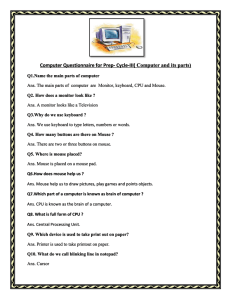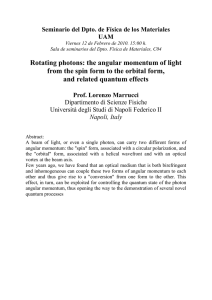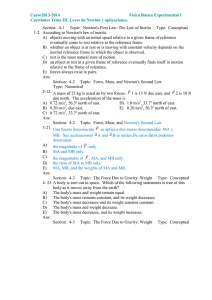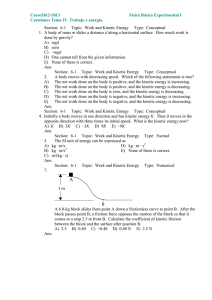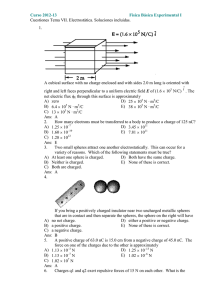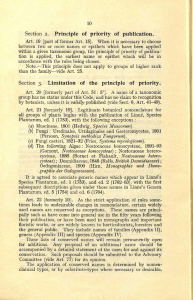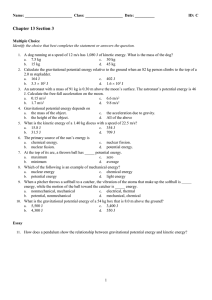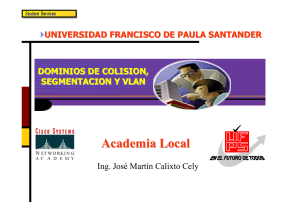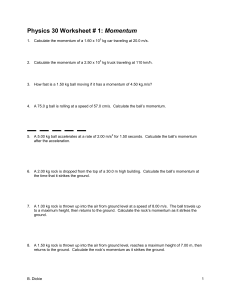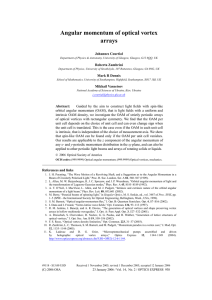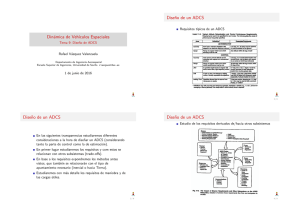Section: 8-1 Topic: The Center of Mass Type: Numerical
Anuncio
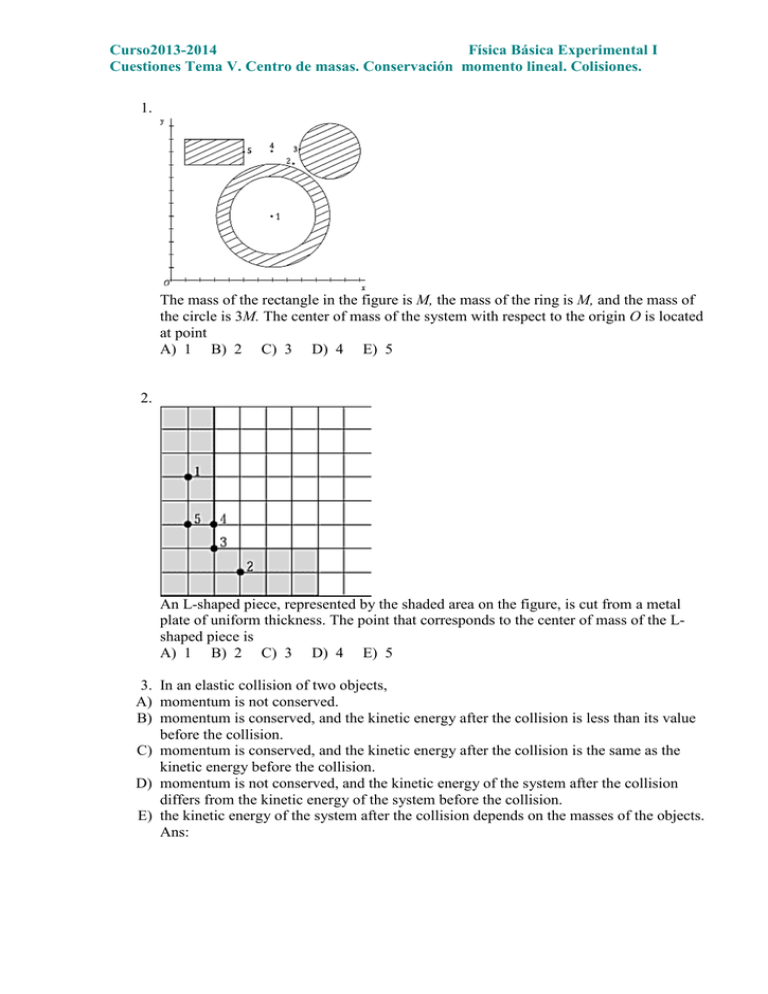
Curso2013-2014 Física Básica Experimental I Cuestiones Tema V. Centro de masas. Conservación momento lineal. Colisiones. 1. The mass of the rectangle in the figure is M, the mass of the ring is M, and the mass of the circle is 3M. The center of mass of the system with respect to the origin O is located at point A) 1 B) 2 C) 3 D) 4 E) 5 2. An L-shaped piece, represented by the shaded area on the figure, is cut from a metal plate of uniform thickness. The point that corresponds to the center of mass of the Lshaped piece is A) 1 B) 2 C) 3 D) 4 E) 5 3. In an elastic collision of two objects, A) momentum is not conserved. B) momentum is conserved, and the kinetic energy after the collision is less than its value before the collision. C) momentum is conserved, and the kinetic energy after the collision is the same as the kinetic energy before the collision. D) momentum is not conserved, and the kinetic energy of the system after the collision differs from the kinetic energy of the system before the collision. E) the kinetic energy of the system after the collision depends on the masses of the objects. Ans: Curso2013-2014 Física Básica Experimental I Cuestiones Tema V. Centro de masas. Conservación momento lineal. Colisiones. 4. The shaded area in the figure represents a uniformly thick sheet of metal. The center of mass of the sheet is closest to point A) 1 B) 2 C) 3 D) 4 E) 5 Ans: 5. A) B) C) D) E) Ans: A uniform horizontal bar is in a region of space where the acceleration due to gravity g varies, increasing from left to right. Where is the location of the center of mass relative to the center of gravity? They are at the same location. The center of mass is to the left of the center of gravity. The center of gravity is to the left of the center of mass. It depends on the shape of the bar. It depends on how much g changes. 6. Three particles having a total mass of 6 kg are subjected to three forces, as shown in the figure. The magnitude of one force is presented to furnish the scale factor for the others. What is the acceleration of the center of mass of the system? A) It is knowable only if the mass of each particle is given. B) 6.6 m/s2 C) zero D) –2 m/s2 ĵ E) –2 m/s2 iˆ Ans: Curso2013-2014 Física Básica Experimental I Cuestiones Tema V. Centro de masas. Conservación momento lineal. Colisiones. 7. A 1.0-kg mass is acted on by a net force of 4.0 N and a 3.0-kg mass is acted on by a net force of 3.0 N, in the directions shown. The acceleration of the center of mass of this system is approximately A) 1.3 m/s2, 53º N of E D) 5.0 m/s2, N of E B) 1.8 m/s2, 45º N of E E) 7.0 m/s2, 53º N of E 2 C) 4.0 m/s , due north Ans: F/m= (42+32)1/2/4=1.25 m/s2, tg θ= 4/3; 53º sobre eje x A) 8. An automobile of mass 1300 kg has an initial velocity of 7.20 m/s toward the north and a final velocity of 6.50 m/s toward the west. The magnitude and direction of the change in momentum of the car are A) 1.26 × 104 kg · m/s at 48º S of E D) 1.78 × 104 kg · m/s at 48º N of W B) 1.26 × 104 kg · m/s at 48º S of W E) 910 kg · m/s at 48º S of E 4 C) 1.26 × 10 kg · m/s at 48º N of W Ans: ∆p= (-6.50i - 7.20j)1300 p=1.26 × 104; tgθ=7.2/6.5; 47.9º S of W Section: 8-4 Topic: Conservation of Momentum Type: Factual 9. The SI units of momentum are A) kg · m · s B) m2/s C) kg · s/m D) kg/J E) kg · m/s Ans: Curso2013-2014 Física Básica Experimental I Cuestiones Tema V. Centro de masas. Conservación momento lineal. Colisiones. Section: 8-4 Topic: Conservation of Momentum Type: Numerical 10. Two identical bodies of mass M move with equal speeds v. The direction of their velocities is illustrated in the figure. The magnitude of the linear momentum of the system is A) 2Mv Ans: 11. A) B) C) D) E) Ans: B) Mv C) 4Mv D) E) In any and all collisions of short duration and for which it is true that no external forces act on the collision participants, kinetic energy is conserved. both momentum and kinetic energy are conserved. neither momentum nor kinetic energy is conserved. the relative velocities before and after impact are equal and oppositely directed. momentum is conserved. 12. An object of mass M1 is moving with a speed v on a straight, level, frictionless track when it collides with another mass M2 that is at rest on the track. After the collision, M1 and M2 stick together and move with a speed of A) v B) M1v C) (M1 + M2)v/M1 D) M1v/(M1 + M2) E) M1v/M2 Ans: A bullet with a mass of 20 g and a speed of 960 m/s strikes a block of wood of mass 4.5 kg resting on a horizontal surface. The bullet gets embedded in the block. The speed of 13. the block immediately after the collision A) cannot be found because we don't know whether the surface is frictionless. B) is 0.21 km/s. C) is 65 m/s. D) is 9.3 m/s. E) None of these is correct. Ans: 14. A 5.0-kg ball and a 10.0-kg ball approach each other with equal speeds of 20 m/s. If they collide inelastically, the speed of the balls just after the collision is approximately A) 1.0 m/s B) 20 m/s C) 6.7 m/s D) 1.5 m/s E) zero Ans: C Curso2013-2014 Física Básica Experimental I Cuestiones Tema V. Centro de masas. Conservación momento lineal. Colisiones. 15. A toy car of mass 2.0 kg moving to the right with a speed of 8.0 m/s collides perfectly inelastically with another toy car of mass 3.0 kg that is moving to the left with a speed of 2.0 m/s. Immediately after the collision the velocity of the system is A) 4.4 m/s to the right. D) –2.0 m/s to the right. B) 2.0 m/s to the right. E) 10 m/s to the right. C) 0 m/s Ans: 16. The balls shown in the figure are strung on a taut wire and slide without friction. If the balls are of equal mass, the diagram that best represents an elastic collision is A) 1 B) 2 C) 3 D) 4 E) 5 Ans: 17. A) B) C) D) E) In a real collision, kinetic energy is conserved. linear momentum is conserved in the absence of external forces. both momentum and kinetic energy are conserved. neither momentum nor kinetic energy is conserved. the extent to which momentum and kinetic energy are conserved depends on the coefficient of restitution. Respuestas (por orden) BDC CBEA BEDED ECBBB
